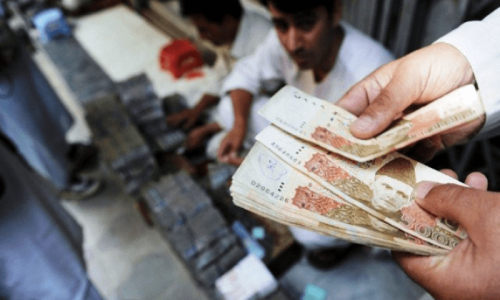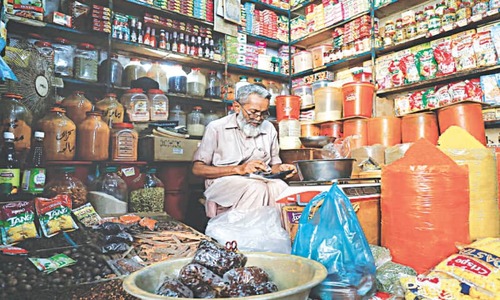HYDERABAD: As wheat procurement is to begin shortly, Sindh has set a target of 0.9 million tonnes to be purchased from farmers at a support price of Rs4,000 per 40kg this season, while a carryover of 0.5m tonnes from previous years is available in godowns.
A better wheat crop is ready for harvest, and the agriculture department estimates four million tonnes of grain in 2023-24. Against the target of 1.2mha (million hectares), 1.272mha were brought under wheat cultivation this season.
The Sindh government almost doubled the support price from Rs2,200 per 40kg in 2021-22 to Rs4,000 in 2022-23 to benefit the farmers affected by floods due to unprecedented rains in July-September.
Wheat procurement has been a tricky job for the food department, which has made a mess of it in the past several years, leading to the prosecution of its officials by the National Accountability Bureau (NAB) for embezzlement. However, neither the farmers nor the consumers benefit from the support price as grain producers often sell their crops for inadequate prices in the market, and ordinary citizens end up buying expensive flour.
Since 2019-20, target was never met; support price fixed at Rs4,000 per 40kg
To sell their produce, small growers end up shunting between food offices. Primarily, grain producers with 1-12 or 1-16 acres are entitled to be offered support price and bardana (gunny bags) to bring grain to wheat procurement centres (WPC). Here comes the real challenge for small growers as they are not provided with bags due to a nexus of traders and food officials always working to serve the vested interest. Bigwigs, including those from the judiciary, police, politicians, law enforcers and powerful landlords, remain poised to get bags and get support prices.
According to Sindh Food Secretary Khalid Mehmood Shaikh, around 168,000 small growers need support price. “We are trying our best to ensure transparency in procurement. Food Minister Jam Khan Shoro is concerned about the whole exercise, and he chaired back-to-back meetings of commissioners and deputy commissioners to ensure that bardana is issued with special emphasis to small growers and transparently.”
An analysis of the past six years’ statistics revealed that the food department only met its 1.4m tonnes procurement target in 2017-18. Thanks to big stocks, no procurement was done in 2018-19, and the target has never been met since 2019-20.
In the last season of 2022-23, says one official, open market had offered higher rates and, therefore, farmers sold grain there instead of the food department. Secondly, massive hoarding was done. So, the food department could procure only 0.777m tonnes of wheat — half of the target. The department’s wheat storage capacity is said to be 700,000 tonnes, and a proposal for enhancing the capacity is underway for which a memorandum of understanding was signed between the food department and the World Food Programme (WFP). Contaminated, adulterated and unhealthy grain had been released to chakkis and flour mills over the last few years.
“Wheat producers are not paid transportation charges, which are applied if WPC is located beyond a certain limit of kilometres. Such charges are to be paid at a rate of Rs6 per maund,” says Nabi Bux Sathio, vice president of the Sindh Chamber of Agriculture. But he laments that a nexus between market forces, including traders, and food officials is not yet broken.
He explains that due to an excessive delay in procurement, growers have to sell their produce in rural areas for inadequate prices to traders, who supply principal inputs on credit. “These traders buy crop in the name of growers’ form-VII. If support price is Rs4,000 per 40kg now, farmers will sell it for Rs3,500-3,600 or even Rs3,400 per 40kg. This grain lands in godowns with price differential filling the coffers of traders and officials,” he says.
For this year’s procurement, the food department needs Rs90 billion to buy 0.9m tonnes of wheat. In addition, liabilities worth Rs156bn, including Rs78.690bn secured loan and Rs77.550bn unsecured loan, stood as of July 1, 2023. Liabilities of Rs116.560bn include payment of support price accumulating on a year-on-year basis. Out of secured loan, Rs30.690bn was cleared by mid-March by the food department and of unsecured loan, Rs9bn was cleared, totalling Rs39.690bn. Similarly, Rs48.01bn of secured and Rs68.55bn of unsecured loan, totalling Rs116.560bn, were still outstanding.
A secured loan is quantum of money equivalent to stocks of wheat available with the government while unsecured amount primarily inclusive of mark-up to be returned by the government. This borrowing is done under the State Bank of Pakistan (SBP) guidelines.
Published in Dawn, March 31st, 2024














































Dear visitor, the comments section is undergoing an overhaul and will return soon.